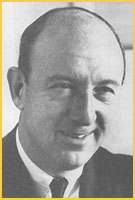

Jerry Hoffberger became chairman of the Baltimore Orioles in 1965 and it was during his ownership that the Orioles experienced their glory years of the 1960s and '70s. He was one of the more active members of baseball's inner circle, particularly on labor relations issues and has been described as one of the hardliners in dealing with the Players' Association. Respected for his philanthropy and community involvement, Hoffberger's wealth came from his stake in the Baltimore-based National Brewing Company (makers of National Bohemian and Colt 45). He passed away in April 1999, at age 80.
 Jerry Hoffberger |
In reading this, I was struck by how often Hoffberger claimed to have no memory of meetings he attended, of people he said that he knew or by what he meant in his letters to Cronin. Most surprising, he also seemed disconnected from the financials of his own team. While it's possible that Hoffberger was being deliberately evasive, it's also possible that he was distracted by more pressing matters close to home: 1) National Brewing had been in decline for years and, in the same year that this deposition was taken, had to merge with the Canadian brewery, Carling; 2) The Orioles, despite being successful on the field, were not drawing well and their attendance for most of the 1970s was below the American League average; 3) Hoffberger was having a hard time getting Baltimore to build a new stadium that was better suited to baseball; 4) A string of successes by the Players' Association threatened to change the economics of the game in a way that displeased most of the owners. Hoffberger, likely frustrated by all of these things, announced in 1974 that the team was for sale—although he continued to own it until 1979, when he found a new owner who was willing to keep it in Baltimore.
For more information about Jerry Hoffberger and the history of baseball in Baltimore, I recommend James Edward Miller's excellent book, The Baseball Business: Pursuing Penants & Profits in Baltimore (The University of North Carolina Press, 1990).